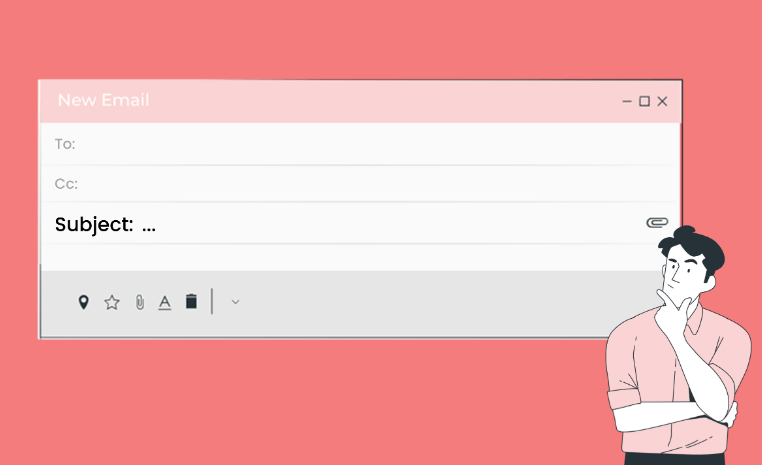Does the mere thought of writing an email to a recruiter have you breaking out in a cold sweat? You’re certainly not alone. Surveys reveal that more than 70% of job seekers get nervous butterflies when faced with this crucial task.
This guide serves up handy tips on crafting a compelling email from start to finish; from creating an engaging subject line right down to signing off like a pro, we’ve got you covered.
Key Takeaways
- Crafting a concise and direct subject line is crucial when writing an email to a recruiter as it helps grab their attention and ensures your message gets across effectively.
- Personalizing the subject line by including the recruiter’s name or mentioning something meaningful about their company can make your email stand out among others in their inbox.
- When greeting the recruiter, use their name and introduce yourself briefly to show that you have taken the time to research and understand who you are reaching out to.
Crafting the Perfect Subject Line
When crafting the perfect subject line for your email to a recruiter, it is important to be concise and direct. A subject line that is too long or vague may cause the recruiter to overlook your email.
Additionally, personalizing the subject line can help grab their attention and show that you have done your research. Using the recruiter’s name in the subject line can make your email stand out among others in their inbox.
Be concise and direct
In your subject line, being concise and direct is the golden rule. This isn’t just about saving space – it also ensures your message gets across effectively. Too much information or overly complex phrases may result in recruiters missing out on key details amidst busy schedules.
Your aim here is to quickly communicate the purpose of your email so that the recipient knows what to expect before they even open it. Filter out any unnecessary words and stick to stating why you’re writing: are you applying for a specific position? Alluding to a shared contact? Perhaps seeking information about opportunities within their organization? Use clear, straightforward language that immediately tells the recruiter why you’ve reached out.
Cutting down on fluff doesn’t mean omitting important context though, make sure relevant details are still included but packaged concisely.
Personalize the subject line
Crafting a compelling subject line for your email to recruiters involves personalization. Paying attention to the details sets you apart, and that includes tailoring your subject line specifically to the job or recruiter.
You might include words relevant to the position you’re applying for or something meaningful about their company.
Personalizing also means avoiding generic phrases like “Job Application” or “Resume Submission”. These oversimplified labels can get lost in a busy inbox. Instead, try capturing the recruiter’s attention with a subject line tailored just for them – such as mentioning a mutual contact, incorporating an upcoming company event you know they’re planning for, or highlighting an award their team recently won.
This personalized approach instantly shows dedication and detailed research on your end.

Greeting the Recruiter
When greeting the recruiter, it is important to use their name and introduce yourself briefly. This personal touch shows that you have taken the time to research and understand who you are reaching out to.
Use the recruiter’s name
Incorporating the recruiter’s name in your greeting fosters a personal connection. It portrays your attention to detail and respect for the individual, demonstrating that you’ve done your homework.
Avoid using generic salutations like “To Whom It May Concern” or “Dear Sir/Madam”. Look up their name on LinkedIn or the company website, if necessary. Using the correct spelling and title is essential too; these small but significant details can make a big difference.
Be sure to keep it formal with “Mr.” or “Ms.” before their last name unless they’ve communicated otherwise with you previously.
Introduce yourself briefly
I’m sure you’re wondering how to introduce yourself in an email to a recruiter. Well, it’s important to keep it brief and to the point. Start by mentioning your name and any relevant background information that makes you stand out as a potential candidate.
Remember, recruiters receive numerous emails every day, so make sure your introduction is concise and captivating. Don’t be afraid to include any impressive achievements or qualifications that are relevant to the position you’re applying for.
Just keep in mind that this is not the time for a long-winded autobiography – be confident and highlight what sets you apart from other applicants.

The Body of the Email
In the body of the email, explain how you found the recruiter’s information and mention any mutual connections or affiliations. Then, highlight your relevant experience and skills that make you a strong candidate for potential opportunities.
Be specific and provide concrete examples to support your claims. Finally, politely request information about potential job openings or upcoming recruitment events.
Explain how you found the recruiter’s information
I discovered the recruiter’s information through various sources, such as job boards, professional networking platforms like LinkedIn, company websites or employee referrals. By utilizing these resources, I was able to locate contact details for recruiters who specialize in my industry or field of interest.
This step is crucial as it shows that you have done your research and are genuinely interested in connecting with the recruiter.
Highlight your relevant experience and skills
In the body of your email, it’s crucial to highlight your relevant experience and skills. This will help the recruiter quickly understand why you are a strong candidate for potential opportunities.
Be concise and mention specific accomplishments or qualifications that align with the job you’re applying for. By showcasing your expertise, you’ll grab the recruiter’s attention and increase your chances of getting noticed.
Request information about potential opportunities
I asked the recruiter to provide information about potential opportunities. By requesting this information, I can gain a better understanding of what positions are available and if my skills align with their needs.
This allows me to tailor my application and increase my chances of securing an interview. It is important to be clear and concise in my request so that the recruiter can easily respond with the necessary details.

Tips for a Successful Email
When writing an email to a recruiter, it is important to follow these tips for successful communication: be professional and respectful in your tone, clearly state your purpose, keep the email brief and to the point, include a clear call to action, and follow up politely if needed.
Be professional and respectful
When writing an email to a recruiter, it is crucial to maintain a professional and respectful tone throughout the message. This means using proper language, avoiding slang or informal expressions, and being courteous in your requests.
Remember that recruiters receive numerous emails every day, so it’s essential to make a positive impression by demonstrating your professionalism and respect for their time. By following these guidelines, you can increase your chances of standing out and creating a favourable impression with the recruiter.
State your purpose clearly
In your email to a recruiter, it is crucial to state your purpose clearly. This means clearly expressing why you are reaching out and what you hope to achieve from the communication.
Whether you are seeking information about job opportunities or requesting an interview, being direct and concise will help the recruiter understand your intentions right away. By stating your purpose clearly, you demonstrate professionalism and respect for the recruiter’s time.
This increases the chances of receiving a prompt response and moving forward in the hiring process.
Keep the email brief and to the point
When writing an email to a recruiter, it is essential to keep the message brief and concise. This means getting straight to the point and avoiding unnecessary details. By keeping your email short, you respect the recruiter’s time and increase the chances of them reading your entire message.
Remember, recruiters receive numerous emails daily, so making yours easy to skim through will ensure they get the key information without feeling overwhelmed. Be clear about your purpose, state what you are looking for or asking for directly, and end with a clear call to action.
Keeping your email brief shows professionalism and demonstrates effective communication skills that recruiters appreciate in potential candidates. If you feel that you have a lot to say and you can’t keep it short and concise, don’t block your ideas and keep writing. Once you are done, you can get help from a summarizer tool to make your content short and concise.
AI summarizers are AI smart tools that can understand the text and the context. These tools can bring out the core concepts to craft a compelling summary. You can give such tools a try if you feel that your email body is going out of perfect length.
Include a clear call to action
To increase your chances of receiving a response from the recruiter, it is crucial to include a clear call to action in your email. A call to action is a direct request or prompt that tells the recipient what you would like them to do next.
For example, you might ask for an informational interview, request a meeting, or inquire about specific job opportunities. By including a clear call to action, you are making it easier for the recruiter to understand your intentions and take appropriate action.
Remember to be polite and professional in your request, showing enthusiasm and interest in their response.
Follow up politely if needed
I always recommend following up with a recruiter if you haven’t received a response within a reasonable amount of time. It’s important to be polite and respectful when reaching out again, as recruiters are often busy and may have missed your initial email.
You can send a brief follow-up message expressing your continued interest in the opportunity and politely asking for an update on the status of your application or inquiry. Remember to keep the tone professional and avoid coming across as pushy or demanding.
A friendly reminder can help ensure that your email gets noticed and increases your chances of receiving a timely response from the recruiter.

Conclusion
In conclusion, writing an effective email to a recruiter is crucial for grabbing their attention and increasing your chances of getting a response. By following the tips mentioned in this guide, crafting a personalized subject line, introducing yourself professionally, and clearly stating your purpose, you can create a compelling email that stands out.
Remember to keep it concise and respectful while also including a clear call to action. With these strategies in mind, you’ll be well-equipped to write emails that impress recruiters and open doors to new opportunities.
Frequently Asked Questions
What should I include in the subject line of an email to a recruiter?
In the subject line, include your name and the purpose of the email, such as “Job Inquiry” or “Application for [Position].”
How long should my email to a recruiter be?
Keep your email concise and to the point, ideally no more than a few paragraphs. Make sure to highlight relevant qualifications and ask any specific questions you may have.
Should I attach my resume and cover letter in the initial email?
It is recommended to attach your resume and cover letter as separate files rather than embedding them in the body of the email. This allows for easier viewing and printing.
How do I address a recruiter in my email?
Address the recruiter by their professional title (e.g., “Dear Ms./Mr.”) followed by their last name unless instructed otherwise.
What’s the best way to follow up after sending an email to a recruiter?
Wait at least one week before following up with a polite and brief message reiterating your interest in the position. It’s important not to come across as pushy or impatient.



